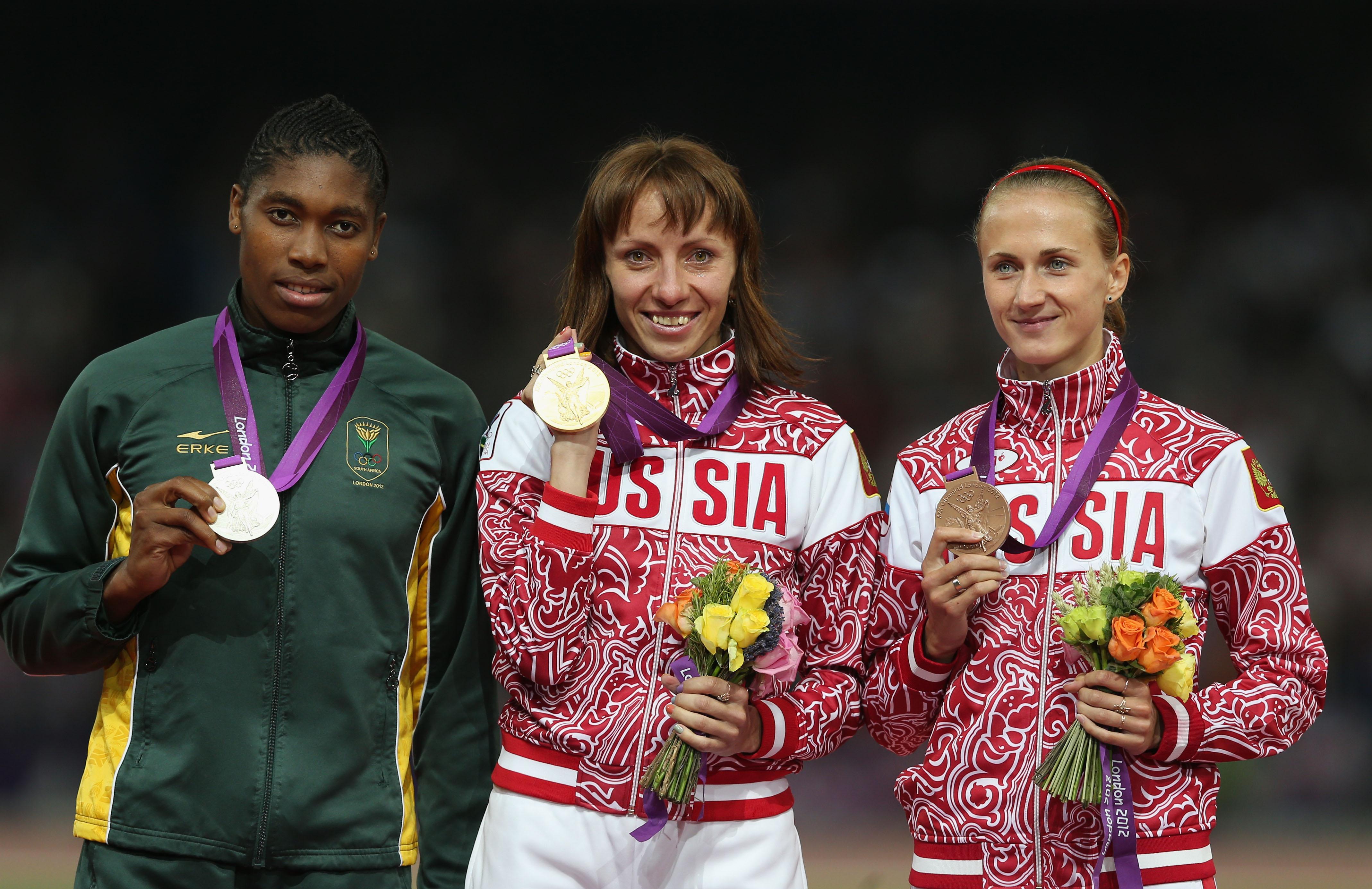Russia’s Mariya Savinova, the reigning women’s world champion in the 800 meters, won the Olympic gold medal on Saturday night. Even so, the Russian got second billing behind the second-place finisher, South Africa’s Caster Semenya. In 2009, Semenya won the world title in the 800 as an 18-year-old. Her reward was being kept out of competition for 11 months while her sport’s governing body investigated her gender. Back on the track, and racing against women, Semenya spent most of tonight’s race at the back of the pack, making her move only in the final 200 meters. It was enough to get her on the podium, but not to win Olympic gold.
After the race, track and field aficionados questioned her tactics. The BBC’s David Ornstein said it appeared that Semenya “had more left in the tank.” His story quoted BBC commentator Kelly Holmes, who won this event in the 2004 Olympics, suggesting that Semenya hadn’t made her best effort: “She looked very strong, she didn’t look like she went up a gear, she wasn’t grimacing at all. I don’t know if her head was in it, when she crossed the line she didn’t look affected.” Meanwhile, Sports Illustrated senior writer Tim Layden tweeted that Semenya “seemed oddly disengaged most of race and not tired at end.”
In her post-race interview, Semenya said, “The body was not really on fire today.” But the spring in her step at the end of the race—Layden said she “seemed aerobically relaxed two steps past finish line”—led others to speculate that she had pulled a badminton move and tanked the race. Why would someone intentionally perform below their standard in the biggest race in four years? One South African track and field observer suggested that it might be “scandal avoidance”—her 2009 triumph brought such unpleasant consequences that she’d just as soon avoid further scrutiny, and an Olympic silver medal brings considerably less attention than the gold.
This response was predictable. In fact, Sports Illustrated’s David Epstein called it in a piece published days before the final: “If Semenya wins the gold, she is likely to be accused of having an unfair advantage. If she runs poorly, she is likely to be accused of sandbagging the race so as not to be accused of having an unfair advantage.”
Epstein summarized the response that followed her high-profile breakthrough in 2009, a year in which she improved her personal best in the 800 meters by more than eight seconds. “The combination of her stunning drop in time, her deep voice, and her armor-like torso elicited venom from some of her competitors,” he wrote. It also led the International Association of Athletics Federations to investigate Semenya’s gender makeup.
Neither the IAAF nor Semenya’s camp have revealed the results of the tests. That doesn’t mean that press outlets haven’t speculated on them—an “allegedly” here or a “reportedly” there often precedes the conjecture. Here SI’s Epstein’s version: “the results … reportedly showed that while Semenya has external female genitalia, she has internal testes, no womb or ovaries and elevated levels of testosterone. This means that she has what doctors call a disorder of sexual development, and has some traits that are typically associated with women and others that are typically associated with men.”
Semenya’s decision not to discuss her hormones and ovaries with strangers likely means that her athletic performance will always be questioned. Is she tanking? Is she being slowed down by hormone treatments? Is she tactically inept? Was her body just insufficiently fiery? I suspect that even if she started every press conference by reciting her estrogen level that day, she’d still be suspect. Described—admiringly—by the New Yorker’s Ariel Levy as “breathtakingly butch,” Semenya is unapologetically strong and muscular—she’s often photographed flexing her biceps, and she made a similar gesture on the medal podium Saturday evening. (A non-standard gender presentation means nothing, of course. I’m called “sir” at least twice a week. That doesn’t mean I can run fast.)
At the end of a long blog post at the Science of Sport blog, Ross Tucker encouraged Semenya to open up about the IAAF’s findings: “If Semenya is to win people over, as she should … then the secrecy must be lifted.” I agree.
Semenya has never run faster than she did the day she won the world title in 2009. If she is sabotaging her races to minimize scrutiny, the tactic is obviously failing—she has already received much more attention than anyone else in the Olympic final. But I suspect that her issues are psychological. Three years ago, the IAAF humiliated her publicly and subjected her to all manner of intrusive physical tests. Track and field’s powers that be eventually cleared her to race, but the whispering will continue until she releases the results. If she doesn’t want to reveal her medical history to millions of nosey strangers, it might be best for her to stay out of the spotlight altogether. That would be a tragedy, but at least it would end all the muttering.
